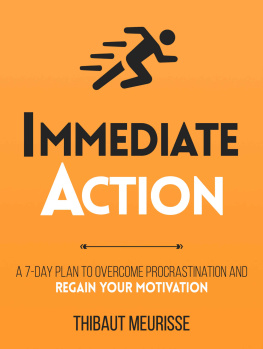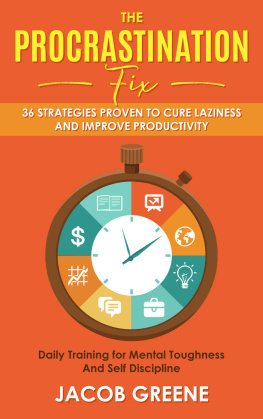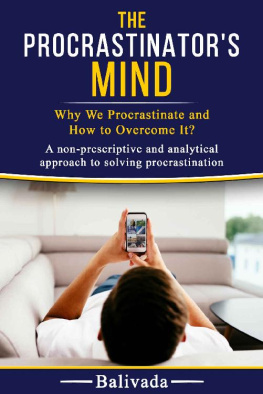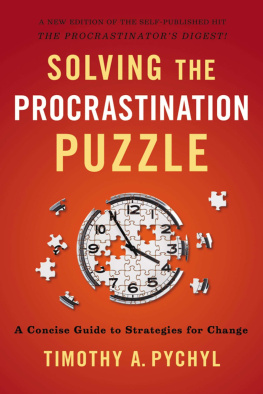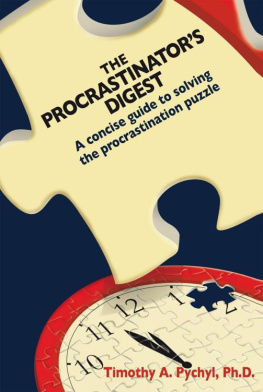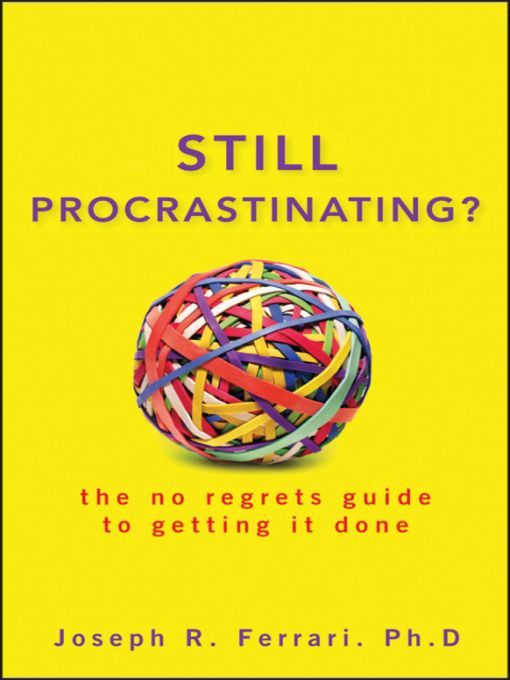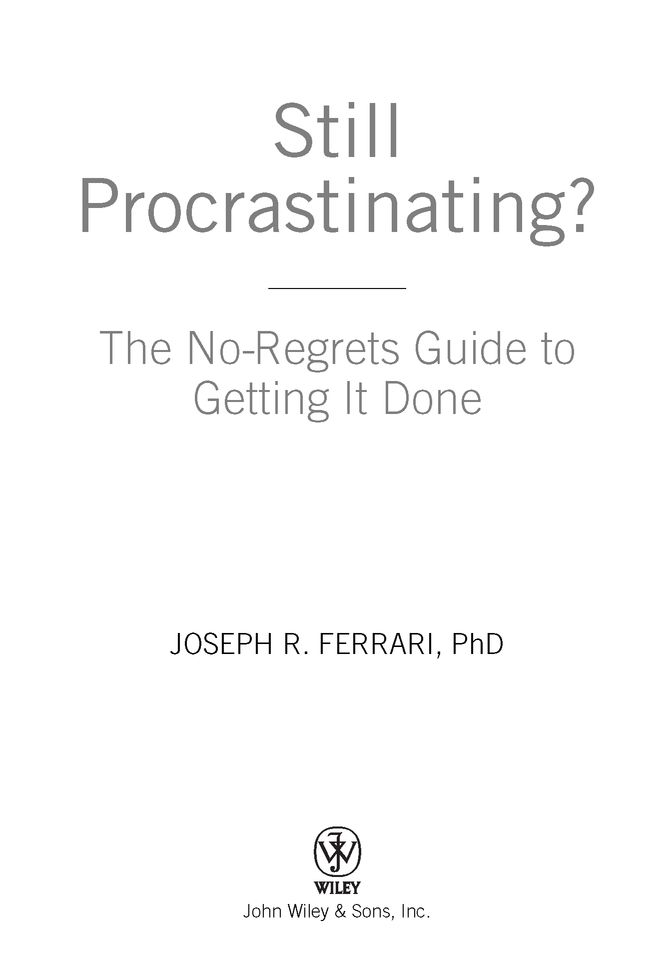Table of Contents
To all of the people who model nonprocrastination in life, to my three children, Catherine, Christina, and Jonathan, and above all my wife, Sharon, who models insight, patience, and the best qualities in my life: I dedicate this book.
Foreword
by
Timothy A. Pychyl, PhD
This book is long overdue. No, its not a case of procrastination. Far from it. Its just that Dr. Ferrari, my dear colleague and friend, has been conducting procrastination research for decades. Weve been waiting for him to write a popular book based on his research.
This is not Dr. Ferraris first book about procrastination, however. In 1995, he co-authored an excellent scholarly book that summarized the research up to that date. It has been a must-read for any scholar interested in the topic. He has also co-edited two other scholarly volumes about procrastination since that time and more journal publications about the topic than any other scholar in the world.
Still Procrastinating? provides a summary of all of Dr. Ferraris research written for everyone, not just those who specialize in psychology. Dr. Ferrari has integrated over twenty-five years of research into his own story about why we procrastinate and how we can learn to act differently.
As a scholar with an international reputation for his research, Dr. Ferrari has worked with academics throughout the world. He has collaborated with colleagues in Australia, South America, the Middle East, and Europe, as well as many others here in North America. And, true to his generosity of spirit, you will see frequent reference to the work of his colleagues and his students in this book.
It is important to recognize that youll hear about Dr. Ferraris students and colleagues research as well as his own, because this reveals something about the essence of the author. In addition to being a valued colleague, Dr. Ferrari is a caring and thoughtful mentor. He has guided many students at DePaul University directly through his work there, and he has mentored many junior colleagues throughout the world in their research. He is community minded, so its not surprising that the other academic hat that he wears is in the community psychology program and as the editor of the Journal of Prevention and Intervention in the Community.
The scholarly community has publicly recognized Dr. Ferraris outstanding contributions to the field. Among his many awards, this Vincent de Paul Distinguished professor has been made a fellow of the American Psychological Association and the Association for Psychological Science and a charter fellow of both the Eastern and Midwestern Psychological Associations. Most recently at DePaul University, he was honored with the Excellence in Public Service award. I see this book as another aspect of Dr. Ferraris public service, an offering of his scholarship to the community at large.
I think this book is a good summary of what Dr. Ferrari has learned about procrastination. It reflects his understanding of this troublesome, self-defeating behavior in a way that allows readers to grasp the main issues identified in his research. Using everyday examples such as Christmas shopping, filing taxes, and simply getting to our most common tasks, Dr. Ferrari highlights how his research explains why we can become our own worst enemies.
In addition to his science, I think youll get an understanding of the author himself. Dr. Ferrari takes the reader beyond the conclusions of his studies and offers his personal insight into how we might address this self-defeating behavior of needless task delay. This advice reflects a great deal of Dr. Ferraris personal philosophy, his beliefs about the world, and what gives life meaning. In doing this, Dr. Ferrari creates a unique blend of science and personal philosophy that will be particularly appealing for those who share his spiritual perspective.
It is tempting to write more by way of introduction to this book and its author, but I think its more important that you get on with your reading. As youll see in the book, Joe and I agree on a very important basic principle about beating procrastination; that is, just get started. Every journey begins with that important first step, and youre about to take that step as you read what this accomplished scholar has written about procrastination.
Timothy A. Pychyl, PhD, is an associate professor of psychology at Carleton University in Ottawa, Canada. He created the popular Web site procrastination.ca, which indexes all current and past scholarship and information on procrastination.
Acknowledgments
Writing this book was relatively easy. Writing these acknowledgments was a challenge. I am sure there are people I have inadvertently omitted, and I am sorry if you are one of them.
My interest in the study of procrastination began in the spring of 1985 sitting in a class taught by Dr. Rebecca Curtis of Adelphi University, in New York, called Self-defeating Behaviors. I raised my hand and asked if procrastination as a self-handicapping strategy had ever been studied. Dr. Curtis said she could not remember for sure, but clearly it must have been done. I didnt stop there, and I found that there was no procrastination research in social-personality psychology, so this would be my focus for a dissertation. I followed the advice I once heard that ones dissertation could be placed well into the current mainstream of a discipline, or could be novel research to make ones career. I chose the latter.
A few small studies along the way led to the late Dr. C. R. Snyder of the University of Kansas phoning me in the early 1990s and saying, Joe, its timeits time for you to write a book on procrastination and to make it the cornerstone of the field. He invited me to do an authored book for his social-clinical series, and I agreed. What a great mentor he was.
A few more studies later, Dr. Tim Pychyl of Carleton University, in Ottawa, invited me to come and speak to his graduate students as he began a research center for procrastination studies. The moment we met, after I stepped off the plane, we became friends. We collaborated on a special edition of a journal issue on procrastination that appeared in 2000. More studies later, that friendship-collaboration led to joining Drs. Henri Schouwenburg and Clarry Lay in an edited book on academic procrastination in 2004.
Along the way, there were keynote conference papers, invited presentations, and wonderful students to work with. I love the students at DePaul; they have taught me so much about research but, more important, about life. My career focuses mainly on undergraduate education, but I mentor masters students and a few doctoral students on procrastination research. Thank you to each of you for working so diligently with me: Christine Chandler, Joe Cohen, April Gonzalez, Corey Hammer, Jesse Harriott, Samantha Keane, Kim Mancina, and Emily Sumner. In addition, I want to thank Todd Bottom and Angela Koenigs for reviewing and editing this book prior to the final version. It is wonderful working with you both.
Among my colleagues, I thank those faculty from Elizabeth Seton College, Mohawk Valley Community College, Cazenovia College, and especially CUNY/Baruch College and DePaul University, who were supportive. Thanks to the chairs who granted time for procrastination research: Jerry Cleland, Shel Cotler, Chris Keys, and Walter Reichman. Colleagues who worked with me over the years need to be thanked, namely: Doris Argumedo, Russ Barone, Mike Berzonsky, Karem Diaz, Juan Diaz-Morales, Jack Dovidio, Leslie Eaton, Bob Emmons, Eva Feindler, Judith Johnson, Bill McCown, Jean OCallaghan, Mike Olivette, Bilge Ozer, Tim Pychyl Steve Scher, Henri Schouwenburg, Dianne Tice, and Ray Wolfe.






